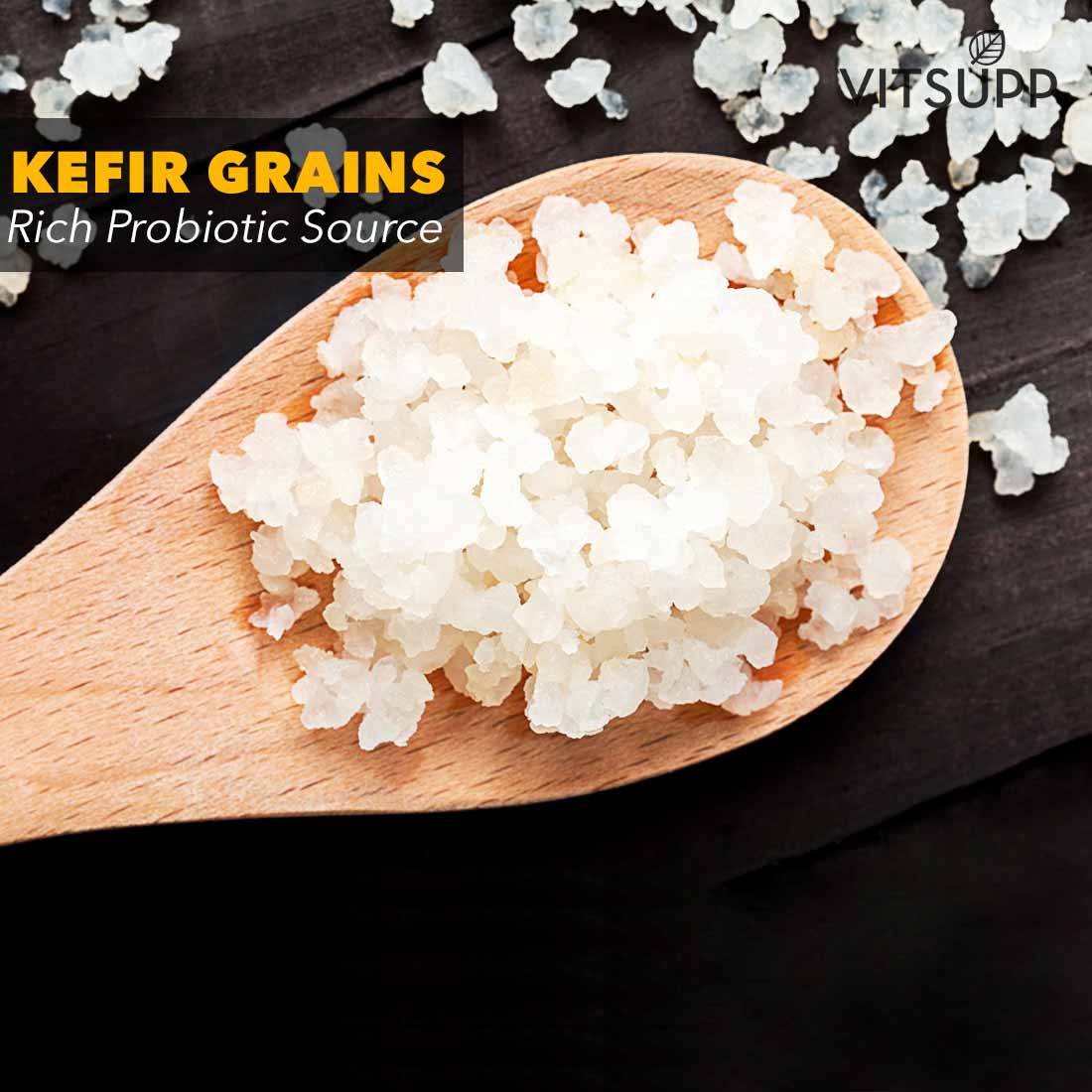When it comes to probiotics, yoghurt has been a favourite among health enthusiasts. But there’s something even better that is slowly but surely gaining popularity. We’re talking about kefir. But what is kefir?
From being an excellent probiotic to a potentially cancer fighting super drink, kefir seems to have it all. But not many people know what this is or what it benefits are.
So here, we dive into everything that you need to know about kefir, its benefits, side effects, and even how to make your own kefir at home! Read on…
Contents
- What is kefir?
- What is kefir grains?
- Kefir Culture Profile
- Kefir vs Yoghurt
- Non-dairy Kefir alternatives
- Kefir Benefits for your Health
- How to Make Kefir at Home?
- Side effects of kefir
- Precautions and warnings
- How to make kefir yogurt drink
- What is kefir in hindi (हिंदी में केफिर क्या है)
- Where to Buy Kefir Grains in India
- FAQ’s
What is kefir?
Kefir, also known as kephir, is a fermented, probiotic-rich beverage that has a tart-like refreshing flavour, which is similar to yoghurt.
Although kefir is not very commonly used in India, it is quite popular in the other parts of the world, particularly in Russia, where it is one of the most common drinks.
Kefir is made from starter kefir grains, which is the combination of yeasts, milk proteins, and gut-friendly bacteria. Kefir contains stomach and gut-friendly, naturally occurring ‘probiotic’ bacteria.

This drink originated in the Caucasus, Eastern Europe and Russia, where it is prepared by adding cow, goat, or sheep milk to kefir starter grains. Starter kefir grains are a combination of milk proteins, bacteria and yeasts.
Kefir Meaning
The word “Kefir” has its origin from the Turkish word “keif”, meaning “good feeling”. It is a unique cultured dairy product known to have incredible healing effects and can cure issues like leaky gut.
It can uplift your immune system and gives an easy boost to your alimentary canal and digestive passageway. This fermented milk drink is prepared by adding kefir grains to cow or goat milk.
Kefir has superior health benefits, and if consumed on a regular basis can largely benefit your gut as well as overall health. It has valuable vitamins and minerals and contains easily digestible complete proteins to give complete probiotic health benefits.
The unique product also has lactase, an enzyme produced by the abundance of beneficial yeast and bacteria. Lactase can break down the lactose content in kefir, after the fermenting and culturing process that goes into making Kefir. (2)
However, the difference between yoghurt and kefir is the number of strains in each. Kefir also has more protein and probiotics compared to yoghurt. Additionally, kefir is also much thinner in consistency than yoghurt which has a much thicker consistency. (1)
What is kefir grains?
Kefir grains are yellow or white in colour. Essentially, kefir grains are a complex mixture of yeast and bacteria. The consistency of kefir grains, along with the right mixture of yeast and bacteria, is held together compounds known as polysaccharides.
Kefir grains contain gut-friendly bacteria and naturally occurring probiotics. It is with kefir grains that you can make kefir or kefir milk drinks. (3)
Kefir Yeast and Bacteria strains
When we say kefir ‘grains’, chances are you might have an image of cereal of grains like wheat and rice in your mind. However, kefir grains are nothing like that. Instead, they are small clusters or colonies of bacteria and yeast. There are several different bacteria and yeast strains present in kefir.
what is kefir grains
Kefir Culture Profile
Kefir is chock full of nutrients, vitamins, dietary minerals, and essential amino acids. It has a pH level of 4.2 to 4.6. Since kefir is made through the process of fermentation, it also contains certain by-products like ethanol and carbon dioxide.
The dietary minerals in kefir include iron, calcium, magnesium, phosphorus, copper, manganese, and zinc, to name a few.
The vitamins present in kefir include vitamin A, vitamin B1, vitamin B3, vitamin B6, vitamin B12, vitamin C, vitamin D, and vitamin E.
Cysteine, leucine, valine, methionine, and phenylalanine are the few amino acids that are present in kefir.
Kefir Probiotic
As mentioned previously, kefir consists of probiotic bacteria. The different kinds of probiotic bacteria that are present in kefir include Bifidobacterium bifidum, Lactobacillus kefiranofaciens, Lactobacillus acidophilus, Streptococcus thermophilus, Lactobacillus helveticus, and Lactobacillus delbrueckii subsp. Bulgaricus, to name a few.
Healthy & Gut friendly Bacteria Strains in kefir
Lactobacillus acidophilus
Lactobacillus brevis
Lactobacillus casei
Lactobacillus delbrueckii subsp. bulgaricus
Lactobacillus delbrueckii subsp. delbrueckii
Lactobacillus delbrueckii subsp. lactis
Lactobacillus helveticus
Lactobacillus kefiranofaciens subsp. kefiranofaciens
Lactobacillus kefiri
Lactobacillus paracasei subsp. paracasei
Lactobacillus plantarum
Lactobacillus rhamnosus
Lactobacillus sake
Lactococcus lactis subsp. cremoris
Lactococcus lactis subsp. lactis
Lactococcus lactis
Leuconostoc mesenteroides subsp. cremoris
Leuconostoc mesenteroides subsp. dextranicum
Leuconostoc mesenteroides subsp. mesenteroides
Pseudomonas
Pseudomonas fluorescens
Pseudomonas putida
Streptococcus thermophilus (8)
Kefir Yeast
Various strains of yeast are present as well. This helps metabolise lactose. Some of the lactose metabolizing yeast strains are Saccharomyces fragilis, Kluyveromyces lactis, and Kluyveromyces marxianus.
The strains of yeast which do not actively take part in metabolizing lactose are also present, some of which are Kazachstania unispora, Torulaspora delbrueckii, and Torulaspora delbrueckii. (4)
Common Kefir yeast strains
Candida humilis
Kazachstania unispora
Kazachstania exigua
Kluyveromyces siamensis
Kluyveromyces lactis
Saccharomyces cerevisiae
Kluyveromyces marxianus
Saccharomyces martiniae
Saccharomyces unisporus (9)
Kefir vs Yoghurt
Yoghurt, as we know, is largely beneficial for our health, specifically our digestive system. Both yoghurt and kefir have a lot of similarities. For example, both yoghurt and kefir have a creamy texture, tart taste, and primarily are a dairy product. Additionally, kefir and yoghurt are both considered as a probiotic food. However, that’s where the similarity ends.
Essentially, kefir has a thin consistency, while yoghurt sets with a more thick consistency. In terms of nutrition profile even though they draw their constituents from milk their nutrient profile may be vastly different. Store-bought yoghurt may have 1-7 strains of probiotics, while kefir may have 10-35 strains of probiotics depending on various conditions. (5)
Let’s look at the differences in more detail –
- Yoghurt has low fat compared to Kefir. Also, kefir has a higher content of protein and probiotics. In fact, one cup of kefir can you give up to 11 grams of protein, as opposed to 6 grams of protein that you get from yoghurt.
- The number of strains and live bacteria and active cultures that are present in kefir is much higher than that of yoghurt. Kefir gas close to 12 various strains of both active and live cultures. Yoghurt, on the other hand, has around 1 to 5. This clearly means that kefir has a larger amount of probiotics than yoghurt.
- The process of making kefir and yoghurt is different. Kefir ferments at normal temperature, whereas many types of yoghurt start culturing under heat.
- The sugar content present in kefir is much lower than that of yoghurt. Flavoured yoghurt, especially, can have high sugar content. (6)

Non-dairy Kefir alternatives
One of the most common non-dairy kefir alternatives is coconut milk. Additionally, you can also use coconut water if you don’t want to use coconut milk. Another common alternative happens to be plain water or sugar water. the plus about using plain water or sugar water is that you can flavour it any way you like. For example, you can add orange zest or lemon juice.
These are other non dairy kefir grains alternatives. We’ve listed a few of them below:
- Coconut Kefir
- Water Kefir
- Almond Kefir
- Cashew Kefir
- Walnut Kefir
- Flax Kefir
- Rice Kefir
- Hazelnut Kefir
- Oat Kefir (7)
Kefir Benefits for your Health
Kefir is quite a popular drink among those who are conscious about their health, and there is a good reason for this. It has a lot of health benefits, and it is believed that kefir has more health benefits than yoghurt.
Let’s look into this now:
1. Kefir has rich nutrition value
A cup of milk kefir will give you close to 110 calories, 11 grams of protein, 12 grams of carbohydrates, 2 grams of fat, 390 milligrams of calcium, 90 micrograms of vitamin A, 12 grams of sugar, and significant amounts of B vitamins, vitamin C, vitamin D, vitamin D, and certain necessary amino acids. (10)
2. Kefir probiotic benefits: It is a great probiotic
We’ve mentioned time and again the kefir is a great probiotic. What makes it great, is it has more than 50 types of probiotics and good for your gut bacteria. In case you’re wondering what probiotics are, then it refers to certain types of bacteria that are added to the bacteria that is already present in your gut. These bacteria asked great for you, specifically for your digestive system.
As a probiotic, kefir can help improve the healthy bacteria ratio in the gastrointestinal tract. (11)
Probiotics are often recommended to people who suffer from diarrhoea. In case you have just had a bout of diarrhoea and were administered a good dosage of antibiotics, then in this case too, probiotics are often suggested. (12)
3. It can help relieve the symptoms of irritable bowel syndrome (IBS).
A good probiotic like kefir can reduce or prevent gastrointestinal infections as well. It can also increase the pace of recovery after a gastrointestinal infection. (13)
Vaginal infections can be treated with the help of kefir. In some cases, people experience an infection in their vagina if there is an imbalance in pH levels. Kefir can help balance this out. Additionally, the good bacteria in kefir can rid the body of bad bacteria or an overgrowth of the same. (14)
4. Can improve bone health and lower the risk of osteoporosis
Osteoarthritis is a medical condition of the bones. In this disorder, the bones become too brittle and weak. One of the most effective ways to treat osteoporosis or enhance the quality of your bones, in general, is by consuming an adequate amount of calcium. Kefir contains a good amount of calcium. (15)
Additionally, it also contains vitamin K2, which is important for the functioning of calcium metabolism. (16)
One animal study observed that kefir had the ability to facilitate the absorption of calcium in the bone cells. (17)
5. May be protective against cancer
Kefir can enhance the functionality of your immune system. Cancer is essentially caused due to the abnormal growth of cells or tumours. Kefir can help the immune system fight against abnormal cell growth, thereby potentially fighting against cancer.
In one study, it was observed that kefir could inhibit the growth of cancer-causing cells in breast cancer, by close to 56%. Yoghurt, on the other hand, can inhibit the growth of cancer-causing cells in breast cancer by 14%.
However, more research and evidence is required to fully confirm the role that kefir plays in protecting the body against cancer-causing cells. (18)
6. Can help with various digestive problems
Being an extremely rich probiotic, kefir contains a huge amount of bacteria that is good for your gut. Studies have shown that kefir can be effective in treating disorders like irritable bowel syndrome, specifically in treating symptoms like diarrhoea.
The bacteria present in kefir is beneficial in treating a leaky gut as well.
Another issue that can be tackled with the help of kefir is the ulcers that are caused by h. Pylori. (19) (25)
7. Lactose intolerant people can enjoy this too
In most cases, even people who are suffering from lactose intolerance can consume kefir. They most likely won’t experience symptoms. This is because the lactose is broken down by the good bacteria that is present in kefir. However, if you do experience side effects, get medical aid. (20)
8 Is effective in treating allergies and asthma
An allergy is caused when the body reacts negatively to particular kinds of foods or substances present in them. Usually, the body has an inflammatory response to most allergy-causing substances.
While anyone can be allergic to something, allergies are most often experienced by people who have an over the sensitive immune system. As mentioned above, kefir can boost immunity by enhancing the immune system, thereby making the body strong against allergic substances.
Additionally, kefir has the ability to suppress the adverse reactions or inflammatory response that your body develops in when you consume or come in contact with an allergen. (21)
9 Kefir Cholesterol benefits
Regular consumption of kefir drink may result into reduction in cholesterol levels. As per a study among women drinking low-fat milk or kefir, participants consumed either 2 servings a day of low-fat milk, 4 servings a day of low-fat milk, or 4 servings a day of kefir. (source) here is what was found:
- Kefir drink supplementation improves the serum lipid profile of premenopausal women.
- Low-fat milk supplementation improves the serum lipid profile of premenopausal women.
- Kefir drink and low-fat milk supplementation exert similar lipid-lowering effects.
The probiotics in kefir may play a role in how much cholesterol the body absorbs from food. They may also affect how the body produces, processes, and uses cholesterol.
How to Make Kefir at Home?
Kefir is available in certain stores and supermarkets, but if you don’t find it in stores, you can always order it online as well.
However, you can also make kefir at home.
For this, you will require kefir grains. Kefir grain can be bought in health food stores or online. You will also require around 500 ml of milk. You can use any milk of your choice, but cow’s milk is the most preferred.
You’ll be surprised at how easy it is to make kefir.
- To a small jar, add around one or two tablespoons of kefir grains. Keep in mind that the more grains you add, the rate at which it cultures will be faster.
- To this, pour the milk that you’ve decided to use. Ideally, 500 ml of milk is usually two cups.
Make sure you don’t fill the jar to the brim. It has to have a space of at least one inch, as the milk will ferment. Close the jar with a clean lid. - After this, let it sit or ferment for over 12 to 36 hours. Make sure it is left at room temperature for the fermentation process to take place effectively.
- In case you want the consistency to be thicker, you can also add a little bit of full fat cream to the milk, before you let it ferment. You can also use full fat milk.
- Once it has fermented, you will see that it looks a little clumpy. You can strain this out, to separate the grains. Your kefir is ready.
Taste and check the tanginess. If you are satisfied, you can make another batch.
The best part about kefir grains is that you can use it again to make more kefir!

Is it safe to make kefir at home?
While the process of making kefir is quite easy, you might be wondering if it is safe. After all, we are dealing with colonies of bacteria and yeast.
Just like any other food, make sure you maintain hygienic conditions while making the drink. Also, ensure that the kefir starter grains have been procured from a reliable source.
Before putting the grains into the jar, make sure that the jar is clean and dry.
When you store the kefir for the fermentation process, keep it in a clean area that is free from dust and dirt. Usually, it takes 24 hours for the process to be complete.
Side effects of kefir
We’ve spoken about the benefits of kefir. However, let’s not disregard the fact that this wonder drink comes with a few side effects as well.
For one, it can cause constipation in some people. Others have also complained of abdominal cramping and pain.
In fact, these side effects can be quite common if you’re new to the consumption of kefir and you’ve just started. Sometimes, it can be your body’s way of getting familiar with it.
Apart from the above mentioned side effects, you might experience some detoxification symptoms as well. Also known as the healing crisis, a detoxification symptom takes place when the body is getting rid of toxins. It is worth noting that the detoxification side effects or the healing crisis are a temporary phenomenon.
If you drink kefir, you are introducing your body to some good, gut-friendly bacteria. The ability of your body to naturally clean and heal is greatly improved when positive bacteria makes entry and interferes with your bodily functions.
A few detoxification side effects that you will notice are general aches in your body, headaches, nausea, flu-like symptoms, diarrhoea, gas and bloating, and a few skin eruptions like boils or acne. (23)
Precautions and warnings
The consumption of kefir is considered safe, however, those who fall under the following categories will have to be careful-
Children: Kefir is considered safe for children above the age of 1. Make sure you consult your child’s paediatrician in case of an allergic reaction.
Pregnant women: Unfortunately, there is no sufficient evidence to confirm whether kefir is safe or harmful for pregnant women. To be on the safer side, avoid consumption.
Victims of AIDS and other autoimmune diseases: Since kefir consists of live bacteria and yeast colonies, doctors say that people who are suffering from AIDS and other autoimmune diseases should not consume kefir. This is to avoid any infection that might take place if the body reacts with the yeast and bacteria present in kefir.
Colon cancer: Kefir can aggravate the side effects caused by colon cancer. Additionally, if you are under chemotherapy, then again kefir can aggravate the side effects. Some of these side effects include diarrhoea, cramping, and bloating. (26)
How to make kefir yogurt drink

What is kefir in hindi (हिंदी में केफिर क्या है)
केफिर एक किण्वित, प्रोबियोटिक समृद्ध पेय है जो दही जैसे ताज़ा स्वाद के साथ होता है। केफिर स्टार्टर केफिर अनाज से बना है, जो yeasts, दूध प्रोटीन, और बैक्टीरिया का संयोजन है। केफिर में पेट और मानव उपयोगी प्रोबियोटिक ‘बैक्टीरिया होता है। केफिर में पाए जाने वाले बैक्टीरिया दही में पाए जाने वाले लोगों के समान ही हैं, हालांकि वे अधिक शक्तिशाली हैं।
Where to Buy Kefir Grains in India
If you are looking to buy Kefir grains in India, you have following resources to buy from. Please note that we have not verified these resources.
- Cultures market GO
- Heal your gut GO
- India weight Loss kefir GO
- India Kefir GO
- Kefir Grains.in
- Happy Life Cultures GO
- Buy kefir grains.com
- Kefir india.in
- The Healthy Foods.org
- KefirCo
- Cuisine Houzz GO
- Kefirwala GO
References
- Kefir – Grains and Beverages: A Review. Researchgate
- Microbiological, technological and therapeutic properties of kefir: a natural probiotic beverage. NCBI Analy Machado de Oliveira Leite, Marco Antonio Lemos Miguel, Raquel Silva Peixoto, Alexandre Soares Rosado, Joab Trajano Silva, and Vania Margaret Flosi Paschoalin
- Kefir nutritional information.
- A Meta-Analysis of Probiotic Efficacy for Gastrointestinal Diseases. Marina L. Ritchie and Tamara N. Romanuk NCBI
- Safety Characterization and Antimicrobial Properties of Kefir-Isolated Lactobacillus kefir. Paula Carasi, Mariángeles Díaz, Silvia M. Racedo, Graciela De Antoni, María C. Urdaci, and María de los Angeles Serradell. NCBI
- Analysis of the microflora in Tibetan kefir grains using denaturing gradient gel electrophoresis. Zhou Jianzhonga, Liu Xiaolia, Jiang Hanhub, Dong Mingshengb. Microbiological study of lactic acid bacteria in kefir grains by culture-dependent and culture-independent methods. Hsi-Chia Chena, Sheng-Yao Wanga,b, Ming-Ju Chena. Source
- Antimicrobial and healing activity of kefir and kefiran extract. Rodrigues KL1, Caputo LR, Carvalho JC, Evangelista J, Schneedorf JM. NCBI
- The Role of Calcium in Human Aging. Judith A. Betocorresponding. NCBI
- Three-year low-dose menaquinone-7 supplementation helps decrease bone loss in healthy postmenopausal women. M. H. J. KnapenN. E. DrummenE. SmitC. VermeerE. Theuwissen. SPRINGER
- Kefir improves bone mass and microarchitecture in an ovariectomized rat model of postmenopausal osteoporosis. Chen HL1, Tung YT, Chuang CH, Tu MY, Tsai TC, Chang SY, Chen CM. NCBI
- Kefir extracts suppress in vitro proliferation of estrogen-dependent human breast cancer cells but not normal mammary epithelial cells. Chen C1, Chan HM, Kubow S. NCBI
- Exploring the Antimicrobial and Hepatoprotective Effects of Kefir; A Probiotic Fermented Milk. Researchgate
- Microbiological, technological and therapeutic properties of kefir:a natural probiotic beverageAnaly Machado de Oliveira Leite1, Marco Antonio Lemos Miguel,Raquel Silva Peixoto2, Alexandre Soares Rosado, Joab Trajano Silva1,Vania Margaret Flosi Paschoalin.
- Kefir Grain Biomass Production: Influence of Different Culturing Conditions and Examination of Growth Kinetic Models. Dilek Kiliç Apar Elçin Demirhan Birsen Özel Belma Özbek. Wiley
- Pharmacological study on kefir–a fermented milk product in Caucasus. I. On antitumor activity. Researchgate
- Effectiveness of probiotics in irritable bowel syndrome: Updated systematic review with meta-analysis. Tina Didari, Shilan Mozaffari, Shekoufeh Nikfar, and Mohammad Abdollahi. NCBI
- Probiotics and irritable bowel syndrome. Riitta Korpela and Leena Niittynen. NCBI
- Anti-inflammatory and anti-allergic effects of kefir in a mouse asthma model. Lee MY, Ahn KS, Kwon OK, Kim MJ, Kim MK, Lee IY, Oh SR, Lee HK. NCBI
- Inhibitory effect of kefiran on ovalbumin-induced lung inflammation in a murine model of asthma. Kwon OK, Ahn KS, Lee MY, Kim SY, Park BY, Kim MK, Lee IY, Oh SR, Lee HK. NCBI
FAQ’s
Q1 What is kefir meaning in hindi?
केफिर एक किण्वित, प्रोबियोटिक समृद्ध पेय है जो दही जैसे ताज़ा स्वाद के साथ होता है। केफिर स्टार्टर केफिर अनाज से बना है, जो yeasts, दूध प्रोटीन, और बैक्टीरिया का संयोजन है। केफिर में पेट और मानव उपयोगी प्रोबियोटिक ‘बैक्टीरिया होता है। केफिर में पाए जाने वाले बैक्टीरिया दही में पाए जाने वाले लोगों के समान ही हैं, हालांकि वे अधिक शक्तिशाली हैं।
Q2 What is kefir grains in hindi?
जब हम केफिर के दानो की बातें करते हैं तो संभावना यह है कि आपके मन में गेहूं और चावल जैसे अनाज की छवि हो सकती है। हालांकि, केफिर के दाने ऐसा कुछ नहीं है। वे बैक्टीरिया और खमीर के छोटे समूह हैं। केफिर में कई अलग-अलग तरह के बैक्टीरिया और खमीर मौजूद हैं।
केफिर के दाने पीले या सफेद रंग के होते हैं। केफिर के दाने खमीर और बैक्टीरिया का एक जटिल मिश्रण है। केफिर के दानो में आपकी आंत के अनुकूल बैक्टीरिया होते हैं और स्वाभाविक रूप से प्रोबायोटिक्स होते हैं। यह केफिर के दाने आपके लिए केफिर या केफिर दूध पेय बना सकते हैं।
Q3 What is kefir meaning in tamil?
கெஃபிர் ஒரு நொதிக்கப்பட்ட, புரோபயாடிக் நிறைந்த பானமாகும், தயிர் போன்ற புத்துணர்ச்சியூட்டும் சுவை. ஈஸ்ட், பால் புரதங்கள் மற்றும் பாக்டீரியாக்களின் கலவையாகும் ஸ்டார்டர் கேஃபிர் தானியங்களிலிருந்து கெஃபிர் செய்யப்படுகிறது. Kefir வயிறு மற்றும் மனித நட்பு, இயற்கையாக நிகழும் ‘புரோபயாடிக்’ பாக்டீரியா கொண்டுள்ளது. கேஃபிரில் காணப்படும் பாக்டீரியாக்கள் தயிர்களில் காணப்படுபவை போலவே இருக்கின்றன, இருப்பினும் அவை மிகுந்த ஆற்றல் வாய்ந்தவை.
Q4 What are water kefir grains
Water kefir grains or Tibicos cultures have a mix of Lactobacillus, Streptococcus, Pediococcus and Leuconostoc bacteria, with yeasts from Saccharomyces, Candida, Kloeckera and possibly others. Just like the milk kefir grains, the microbes present in tibicos act in symbiosis to maintain a stable culture. Tibicos can do this in many different sugary liquids, feeding off the sugar to produce lactic acid, alcohol (ethanol), and carbon dioxide gas, which carbonates the drink.
Q5 How to dry water kefir grains?
If you want to retain water kefir grains for a longer time or want to keep integrity of a batch, we recommend you to dry out the water kefir grains. Here is the method for drying water kefir grains:
- Use generous amount of filtered water to Rinse kefir grains thoroughly.
- Now put them on a piece of unbleached paper in a covered location.
- Let them dry at the normal room temperature for 3 to 5 days. The duration will depend on humidity and temperature.
- In a few days the water kefir grains will dry out and now you can store it in a ziploc bag in the refrigerator for up to 6 months.
- Whenever you need the dried out water kefir grain batch, rehydrate your batch of grains.
Q6 How to store water kefir grains?
If you want to store water kefir grains for a longer time or want to keep integrity of a batch, we recommend you to dry out the water kefir grains with the method above.
Q7 How to make kefir taste better?
You can make kefir drink with the recipe given above in the article or you can flavour it with any other ingredient such as chocolate or vanila flavour.
Q8 How to make kefir thick like yogurt?
Here is how to make thick kefir:
- Method 1: Seive out the excess water to make kefir thick and creamy.
- Method 2: Use full cream milk. Full cream milk is thinker and will convert into a thicker kefir.
- Method 3: Use cows milk as it is thicker compared to goat or buffalo milk. This results into thicker kefir.
- Method 4: Put the milk in the fridge after fermentation and do not allow it to stay out for a long time. If kefir ferments for a very long time it will result into a think drink.
- Method 5: Let kefir ferment only in the refrigerator. This will rsult into slow fermentation time.
- Method 6: Add cream or thickener into kefir to thicken it.
Q9 What is kefir called in India?
Kefir is called kefir in India. It does not have any other local name.





